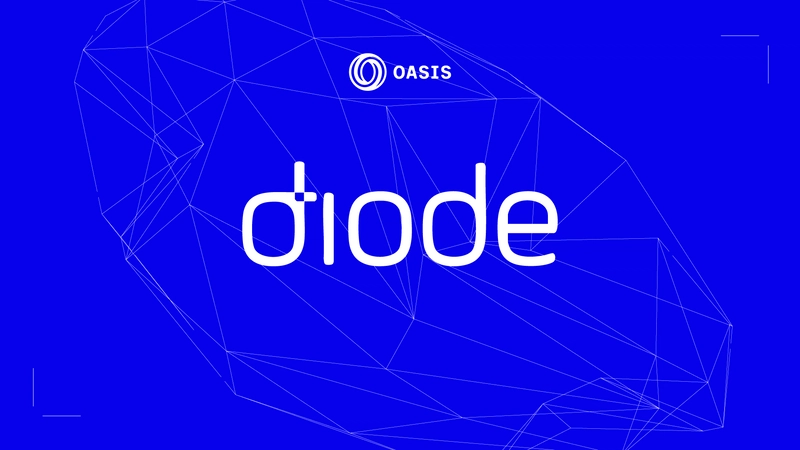Zero-Trust Networking Meets Confidential Smart Contracts: Diode x Oasis Sapphire
In the push toward full-stack privacy for Web3, Oasis and Diode are teaming up to take a major leap forward—bringing zero-trust networking to Oasis Sapphire. If you’re a developer building decentralized apps, this changes how you think about securing not just computation, but also communication. Why Does the Network Layer Still Leak? Confidential smart contracts like those on Oasis Sapphire protect the logic and data inside your dApp. But what about the layers around it? → API calls to off-chain services? → Wallet connections to your frontend? → User interactions transmitted over the open web? Without protection at the network level, these elements can expose sensitive user activity, metadata, and endpoints—even if your smart contract is fully private. Enter Zero-Trust Networking with Diode Diode brings a decentralized, zero-trust networking model that complements Sapphire’s confidential compute. The idea? Don’t trust any device or endpoint by default. Authenticate and encrypt everything, from peer to peer. Here’s what that means for devs: → End-to-End Encryption – All traffic between client, contract, and API is encrypted that means no leaks. → Decentralized Relay Network – Route traffic without relying on centralized infrastructure. → Strict Access Control – Enforce who can access your dApp and how—based on identity, not IP. Why It Pairs Perfectly with Oasis Sapphire Oasis Sapphire already gives you: → Private smart contracts using Trusted Execution Environments (TEEs). → EVM compatibility, so you can build in Solidity. → Off-chain data confidentiality, even during compute. With Diode’s zero-trust networking: → You now get privacy from frontend to backend to chain. → Verifiable identities for users and devices accessing your app. → No centralized backdoors or snooping at the networking layer. Real Use Cases → Private DeFi – Keep trading activity confidential from network sniffers and MEV bots. → AI Agents – Protect the full decision pipeline—from off-chain input to confidential inference. → Secure Governance – Ensure voting data isn't leaked during transmission. → Privacy-Preserving Frontends – Deliver dApps without revealing user behavior or metadata.

In the push toward full-stack privacy for Web3, Oasis and Diode are teaming up to take a major leap forward—bringing zero-trust networking to Oasis Sapphire. If you’re a developer building decentralized apps, this changes how you think about securing not just computation, but also communication.
Why Does the Network Layer Still Leak?
Confidential smart contracts like those on Oasis Sapphire protect the logic and data inside your dApp. But what about the layers around it?
→ API calls to off-chain services?
→ Wallet connections to your frontend?
→ User interactions transmitted over the open web?
Without protection at the network level, these elements can expose sensitive user activity, metadata, and endpoints—even if your smart contract is fully private.
Enter Zero-Trust Networking with Diode
Diode brings a decentralized, zero-trust networking model that complements Sapphire’s confidential compute. The idea? Don’t trust any device or endpoint by default. Authenticate and encrypt everything, from peer to peer.
Here’s what that means for devs:
→ End-to-End Encryption – All traffic between client, contract, and API is encrypted that means no leaks.
→ Decentralized Relay Network – Route traffic without relying on centralized infrastructure.
→ Strict Access Control – Enforce who can access your dApp and how—based on identity, not IP.
Why It Pairs Perfectly with Oasis Sapphire
Oasis Sapphire already gives you:
→ Private smart contracts using Trusted Execution Environments (TEEs).
→ EVM compatibility, so you can build in Solidity.
→ Off-chain data confidentiality, even during compute.
With Diode’s zero-trust networking:
→ You now get privacy from frontend to backend to chain.
→ Verifiable identities for users and devices accessing your app.
→ No centralized backdoors or snooping at the networking layer.
Real Use Cases
→ Private DeFi – Keep trading activity confidential from network sniffers and MEV bots.
→ AI Agents – Protect the full decision pipeline—from off-chain input to confidential inference.
→ Secure Governance – Ensure voting data isn't leaked during transmission.
→ Privacy-Preserving Frontends – Deliver dApps without revealing user behavior or metadata.







































































![Is This Programming Paradigm New? [closed]](https://miro.medium.com/v2/resize:fit:1200/format:webp/1*nKR2930riHA4VC7dLwIuxA.gif)

